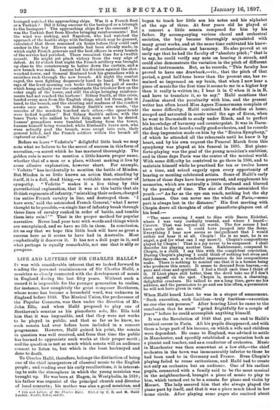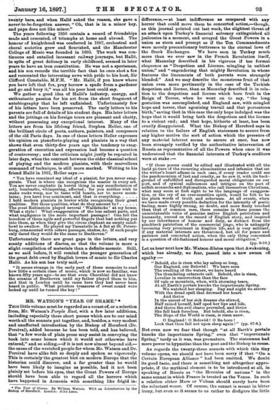LIFE AND LETTERS OF SIR CHARLES HALLE.* IT was with
considerable interest that we looked forward to ratding the personal reminiscences of Sir Charles Halle, a musician so closely connected with the development of music in England during the last fifty years. Without such a record it is impossible for the younger generation to realise, for instance, how completely the great composer Beethoven, whose name has become a household word, was unknown in England before 1848. The Musical Union, the predecessor of the Popular Concerts, was then under the direction of Mr. John Ella, and when Halle proposed to play one of Beethoven's sonatas as his pianoforte solo, Mr. Ella told him that it was impossible, and that they were not works to be played in public, and that so far as he knew, no such sonata had ever before been included in a concert programme. However, Haile gained his point, the sonata in question was well received, and from that time the public has learned to appreciate such works at their proper merit ; and the question is not so much which sonata will an audience consent to listen to, but which is the least hackneyed and done to death.
To Charles H3.116, therefore, belongs the distinction of being one of the chief interpreters of classical music to the English people ; and reading over his early recollections, it is interest- ing to note the atmosphere in which the young musician was brought up. He was born at Hagen, in Westphalia, in 1819; his father was organist of the principal church and director of local concerts ; his mother was also a good musician, and • W. and Letter, of Sir Charles Haw. Ei.td by C. E. and M. Hall6 London : 8aib, Edr, and Co.
began to teach her little son his notes and his alphabet at the age of three. At four years old he played at
a concert a little sonata composed for him by his father. By accompanying various choral and orchestral
societies, the boy became thoroughly acquainted with many great works, and at the same time cultivated his know- ledge of orchestration and harmony. He also proved at an early age that he had the faculty of "absolute pitch ; " that is to say, he could verify any note on hearing it struck, and could also demonstrate the variation in the pitch of different musical instruments. But, as he records, "This faculty has proved to have one drawback,—viz., that the pitch of that period, a good half-tone lower than the present one, has re- mained so impressed on my brain, that when I now hear a piece of music for the first time it seems to me in a higher key than it really is written in; I bear it in C when it is in B, and have to translate it, so to say." Halle mentions that Joachim shared the peculiarity with him, and the present writer has often heard Miss Agnes Zimmermann complain of the same difficulty. Halle continued his studies at home, steeped and saturated in music until the age of fiteen, when he went to Darmstadt to study under Rinck, and to perfect his knowledge of harmony and counterpoint. It was in Darm- stadt that he first heard a really good orchestra, and he records the deep impression made on him by the "Eroica Symphony," of which he attended all the rehearsals until be knew it by heart, and by his own request the Funeral March from this symphony was played at his funeral in 1895. But piano- forte-playing was the goal of the young musician's ambition, and in those days Paris was the centre of the musical world. With some difficulty he contrived to go there in 1836, and to maintain himself while he practised for ten or twelve hours at a time, and seized eagerly upon every opportunity of hearing or meeting celebrated artists. Some of Halle's early letters of those days have been preserved, and supplement his memories, which are naturally a little confused and blurred by the passing of time. The size of Paris astonished the youth :—" As far as the eye can reach, nothing but the sky and houses. One can never see the whole of Paris,—some part is always lost in the distance." His first meeting with Chopin drove all thoughts of other pianoforte-players out of his head :—
" The same evening I went to dine with Baron Eichthal, where I was very cordially treated, and where I heard- CHOPIN. That was beyond all words. The few senses I had have quite left me. I could have jumped into the Seine. Everything I hear now seems so insignificant that I would rather not hear it at all. Chopin ! He is no man, he is an angel, a god (or what can I say more ?). Chopin's compositions played by Chopin ! That is a joy never to be surpassed. I shall describe his playing another time. Kalkbrenner, compared to Chopin, is a child. I say this with the completest conviction. During Chopin's playing I could think of nothing but elves and fairy-dances, such a wonderful impression do his compositions make. There is nothing to remind one that it is a human being who produces this music. It seems to descend from heaven,—so pure and clear and spiritual. I feel a thrill each time I think of it. If Liszt plays still better, then the devil take me if I don't shoot myself on the spot. Chopin is, moreover, a charming, delightful creature. He talked to me a long time, gave me his address, and the permission to go and see him often, a permission he will not have given in vain."
When Halle heard Liszt he was in a stupor of amazement. Such execution, such limitless—truly limitless—execution no one else can possess." After hearing Liszt he came to the
conclusion that he must "grind frightfully for a couple of years" before he could accomplish anything himself.
It was the Revolution of 1848 that put an end to Halle's musical career in Paris. All his pupils disappeared, and with them a large part of his income, on which a wife and children were dependent. He came to England, was advised to settle in Manchester, and speedily established a reputation both as a pianist and teacher, and as a conductor of orchestra. Music in Manchester was then somewhat at a low ebb,—the chief orchestra in the town was immeasurably inferior to those he had been used to in Germany and France. Even Chopin's playing failed to rouse enthusiasm, and Halle had to create not only an orchestra but an audience. One of his earliest
pupils, connected with a family said to be the most musical in the neighbourhood, brought a piece of music to play to
him, which turned out to be a sonata for piano and violin by Mozart. The lady assured him that she always played the piano part by itself, and that it was a piece much liked in her home circle. After playing some pages she omitted about twenty bars, and when Ha116 asked the reason, she gave a never.to-be-forgotten answer, "Oh, that is in a minor key, and papa does not like minor."
The years following 1850 contain a record of friendships made and cemented, of triumphs at home and abroad. The honour of knighthood was conferred in 1887, orchestral and choral societies grew and flourished, and the Manchester College of Music was founded in 1893. The work was con- tinuous and entailed incessant railway journeys, but Halle, in spite of great delicacy in early childhood, seemed in later years to have an iron constitution. He was not a sportsman, and his son records the terrible fact that he once shot a fox and recounted the interesting news with pride to his host, Sir Clifford Constable, M.F.H. "Mr. Halle, if you know where you have left that fox, pray borrow a spade from a gardener and go and bury it," was all his poor host could say.
We gather a good idea of Halle's industry, energy, and enthusiastic passion for his art from the short fragment of autobiography that he left unfinished. Unfortunately few of his letters have been preserved. The early letters to his parents are fall of details of his student days. His later letters and the jottings on his foreign tours are pleasant and chatty, without possessing any exceptional interest. Many of the letters are from his lifelong friend, Stephen Heller, one of the brilliant circle of poets, authors, painters, and composers of the old Paris days. In one of these letters Heller expresses his opinion on pianoforte-playing and pianists in a way that shows that even thirty-five years ago the tendency to exag- geration of execution and expression had become a question of controversy; and the criticism might justly be repeated in later days, when the contrast between the older classical echool of playing and the modern pianists, with their marvellous command of technique, is still more marked. Writing to his friend Halle in 1861, Heller says :—
" You have remained my ideal of a pianist, for you never exag- gerate. That is where one recognises the master in every art. You are never emphatic (a horrid thing in any manifestation of art), bombastic, whimpering, affected ; for you neither wish to make rocks weep, nor to tame wild beasts, nor to move moun-
tains; you have true sentiment, and that is everything I hold modern pianists in horror while recognising their great qualities. But these qualities, what do they amount to P
The great Rubinstein played several Waldstficke ' at my house What a style ! What exaggeration of the less salient parts, and what negkgence in the more important passages I One felt the boredom of those agile and powerful fingers that had nothing put into them, as when they give the circus elephant an empty salad- bowl to swallow. He played my Tarantelle in A flat at St. Peters- burg, ornamented with octave passages, shakes, &c. If such people only dared they would do the same to Beethoven."
Unfortunately there are great gaps in the letters, and very scanty additions of diaries, so that the volume is more a slight compilation of materials than a definite memoir. Still, as we said before, it will remind the younger generation of the great debt owed by English lovers of music to Sir Charles Halle As his son has truly said,—
" It seems strange in the early part of these memoirs to read how little a certain class of music, which is now so familiar, was known fifty years ago—to see that even Cherttbini did not know the sonatas of Beethoven until my father played them to him, and that in London until he came here they had never been heard in public. What priceless treasures of sweet sound were locked up until he turned the key !"







































 Previous page
Previous page